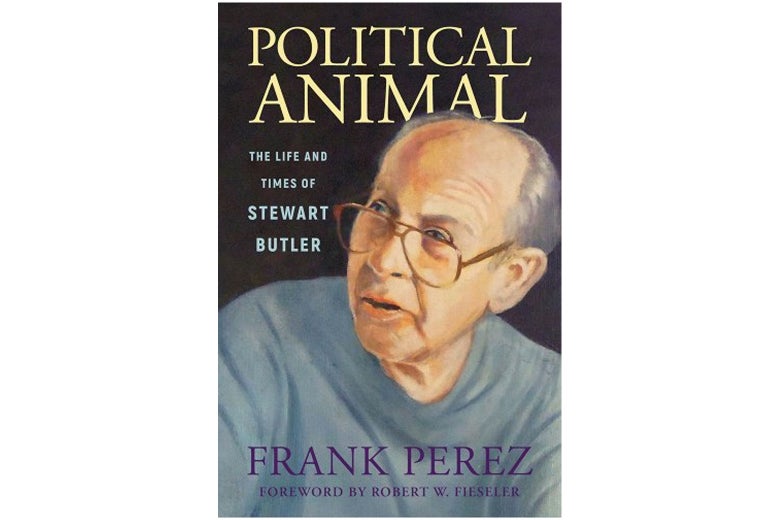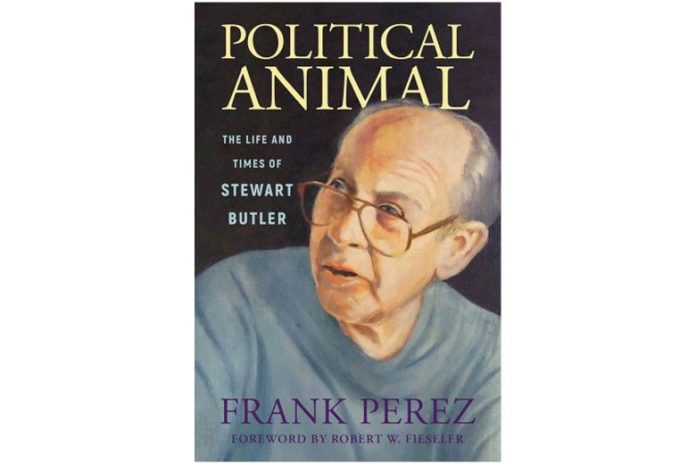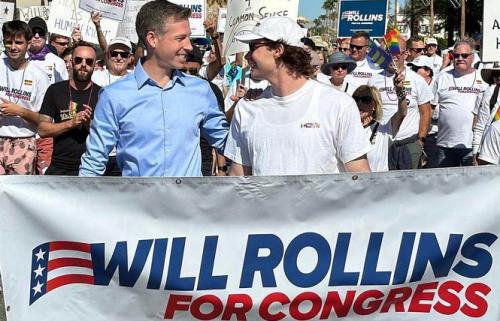Adapted from the forward to Political Animal: The Life and Times of Stewart Butler by Frank Perez, out Oct. 17 from the University of Mississippi Press.
In July 1987, Pope John Paul II touched down in New Orleans on an official papal visit, bringing with him a rare Beatles-level star power hardly seen outside of Mardi Gras in this Catholic-majority American city.
Thousands rushed downtown to Canal Street for the pope’s honorary parade, where he greeted admirers behind the bulletproof glass of the popemobile. Some New Orleans Catholics fainted as the pontiff waved, as if touched by Freddie Mercury. Bursting through a security fence as the popemobile neared and then coasted past, four gay rights activists emerged onto Canal Street bearing a rainbow banner. At the height of the AIDS crisis, when John Paul II had yet to meet with a single AIDS patient, these gay men were determined to upset the common merriment.
Advertisement
Advertisement
Advertisement
Advertisement
Strutting in front of their entourage “sort of as a drum majorette, you might say,” recalled the group’s activist leader, was an 18-year-old twink in a thong, who suggestively humped the air to bait onlookers. As faces on the sidewalk registered shock and then anger, the gay activists chanted, “Out of the closets, into the streets!!” and “Act Up, Fight Back, Fight AIDS!!” just a few feet behind the Vicar of Christ, a man whose canon denied their very identities. “The four of us,” recalled the group leader, “we followed the popemobile down Canal Street for at least a few blocks.” The pope somehow never turned his head to catch the scene behind him. Before police could arrest the activists, the group leader signaled for the contingent to turn off at a side street, and they scattered as quickly as they’d appeared. That queer agitator, that provocateur, was none other than New Orleans’ “political animal” Stewart Butler.
Advertisement
Advertisement
Perhaps the most important person in the history of queer Louisiana politics never held elected office. He was an old, bald, gay, white hippie whose friends had burned to death, who wore dashiki hats and was once arrested at Louis Armstrong New Orleans International Airport for the possession of 22 joints. He did not hold rallies or give rousing speeches, nor did he present himself as a moral example. Rather, he was a gay Gandalf character who enjoyed the company of wayward young men, some of barely legal age. In style and in substance, Stewart P. Butler was not a member of the American “political class.” No, they who honed debate skills at Princeton and spent their lives plotting the perfect résumés never found their way to the dining-room table of Stewart’s home at 1308 Esplanade Ave. in New Orleans. At that den, dubbed the “Faerie Playhouse” by its sundry tenants, Stewart toiled for decades. He proclaimed himself a “political animal,” a relentless organizer engaged in the daily trench work of social change.
Advertisement
Advertisement
Advertisement
Advertisement
I first met Stewart Butler in 2014 while researching my debut book Tinderbox: The Untold Story of the Up Stairs Lounge Fire and the Rise of Gay Liberation. Tinderbox is a nonfiction account of a notoriously unsolved arson at a gay bar that Stewart had lived through in the early 1970s. My book-in-progress demanded that I speak to the few remaining survivors and witnesses of said calamity. I was so nervous when I first called Stewart, feeling so much of the weight of history, that I spoke unintelligibly fast into his answering machine. He couldn’t make out my phone number, though he tried and tried by replaying the message, so he personally called around town to track me down. When I first heard his puckish voice over the line, it was the sound of Stewart chiding me for talking too fast while simultaneously agreeing to help me as much as I needed.
Advertisement
Advertisement
Stewart had a generous spirit. We spoke more than a dozen times at the Faerie Playhouse, that unmistakable pink residence dotted with red hearts on a tree-lined boulevard, and our talks lasted about an hour each. Though Stewart’s health was fading in his mid-80s, though he shuffled with oxygen tubes in his nostrils, his mind had bursts of energy and clarity. These were some of the most illuminating—and warmly flirtatious—conversations of my life.
Advertisement
Advertisement
The origins of Stewart’s queer activism moved me deeply. He began the Sunday night of June 24, 1973, believing that keeping “body and soul together,” as he put it, was enough to constitute a well-lived life as a gay American. He approached his favorite New Orleans watering hole, a gay bar called the Up Stairs Lounge, possessing much. At 42 years of age, he had several joints in his pocket, a lover of enviable looks and wealth, a steady job, a beautiful rental home, and a bounty of friends. Sure, he was legally second-class. Closeted at work, he knew an employer could fire him without recourse if his sexuality became known. State laws could have him and his lover arrested in their bedroom for “crimes against nature,” with mandatory prison sentences if convicted. Local ordinances could have them locked up for drinking a beer in a bar while gay or occupying space on a sidewalk while homosexual or evicted for creating a “house of ill repute” by virtue of living together in a rental. Living as a sex criminal, as defined by law, Stewart accepted that he could never viably run for public office or be seriously courted by a major party. Yet, he was proud to be honestly and truly himself in the life of his choosing. Besides, a homosexual of his era could build an enviable private world so long as he played it cool with flagrant behaviors that would brand him a criminal and an outsider.
Advertisement
Advertisement
Advertisement
So Stewart thought until that Sunday. He and his lover, Alfred Doolittle, ducked down a side street bordering the French Quarter called Iberville and trudged up 13 wooden steps of a twisting staircase, which led to a working-class gay haven. They opened a nondescript metal door and entered an oasis chamber teeming with beefcake posters on red-flocked wallpaper and the frolicsome laughter of gay friends. Gossip and singing and piano music flowed through the Up Stairs Lounge like warm currents. Alfred imbibed his fill of the Beer Bust, the bar’s Sunday night drink special of $1 for two hours of unlimited draft beer, while Stewart stuck to vodka and dished with his gay barber Louis “Horace” Broussard. The night’s revelry was only briefly disturbed when a drunken hustler picked a fight in the bar and had to be forcibly removed. The dejected man bizarrely screamed, “I’m going to burn you all out” as bar staff dragged him toward and then down the front staircase, which served as the bar’s sole entrance and exit.
Advertisement
But the music and fun recommenced, and only Alfred seemed to take the hustler’s threat seriously. It was at Alfred’s insistence that Stewart felt compelled to leave the Up Stairs Lounge for another bar around 7:40 p.m. The couple fought about Alfred’s paranoia on the staircase landing to the bar, then at ground level, then all the way down Iberville Street to a rougher dive called Wanda’s, where they ordered another round. The booze had barely touched their lips when sirens blared and a fire engine blurred past. The engine plowed aside a taxi as it headed straight in the direction of the Up Stairs Lounge. Something horrific clicked in Stewart’s head, and he retraced the path that he and Alfred had just walked.
Advertisement
Advertisement
Advertisement
Advertisement
Advertisement
Stewart traced the plumes of smoke down the street to their source. “I kind of approached it slowly,” Stewart recalled. “And all this [throwing up his hands], gradually.” He would remember this walk, 145 steps from the door of Wanda’s to the blazing bar, for the rest of his life. As I wrote in Tinderbox, “The street reflected the blowout of an explosion: fire leaped from windows and smoke wafted off bodies, with friends pointing and officials yelling. Everything seemed to shout for Stewart’s attention; few details connected or made sense.” Friends were dead in that second-story bar. How many, he could not tell, although he could not find his barber Louis “Horace” Broussard among the survivors, some of whom lay screaming with scorched or flayed skin on the sidewalk. Men he stood beside as equals minutes before, compatriots in a secret lifestyle, had burned upstairs in a horrific mass. They were now reduced to memories, little more than ashes, their voices silenced.
Advertisement
On the street, Stewart heard a police officer explaining to a newspaper reporter, “Some thieves hung out there, and you know this was a queer bar.” He personally witnessed the Up Stairs Lounge bartender spot and grab the soot-covered hustler, who’d only so recently been ejected from the Up Stairs Lounge threatening to “burn” the place down. Dragging the hustler toward a police officer holding back the gathering crowds, drawn to the spectacle of flames, the bartender demanded that the hustler be arrested and questioned as a suspect. Stewart stood aghast as the police officer feigned distraction and then told the Up Stairs Lounge bartender to “move along,” demanding the release of the restrained man.
Advertisement
Stewart watched that hustler, the primary suspect for an arson that would claim 32 lives, the deadliest fire on record in New Orleans history, melt into the crowds of the French Quarter and disappear, dead by suicide nearly a year later. Police would never question that hustler even though, at one point in their investigation, they held him in their custody. The fire, it became understood, was not a crime that Greater New Orleans demanded to be solved, as the victims were of a criminal class. This was a sordid example of deviants killing deviants, some justified, part of a broader community warning to install sprinkler systems in old buildings but not an occasion to prosecute an arsonist through the courts.
Advertisement
Advertisement
Up to that moment, Stewart had bought the line fed to New Orleans’ large, yet cowed queer population: Stay hidden, stay discreet, and you can revel alongside all the other vice-takers in our live and let live community. But where was “live and let live” in that panorama of death? Where was the reward for lifelong discretion? Where was the law’s protection when a likely killer stood before a police officer who could only see two criminal fairies having a scrape? What do you do when an entire society, and its people, will not hear you? Stewart asked himself these questions for nearly a decade, during which he rued the Up Stairs Lounge fire as a catastrophe “no good came of.”
Advertisement
Advertisement
Advertisement
Stewart eventually processed his grief with a personal answer. What do you do when people refuse to hear you? “Make them hear you, honey,” as he liked to say. Stewart defiantly entered the arena of politics, standing openly among the first-class citizens of New Orleans, though he had not yet be accepted as one of them.
So was the “political animal” born from the scorched seeds of trauma and tragedy. So did he finally engage his stubborn campaigns that would endow civil rights to queer folk, starting in 1980. Stewart’s efforts would result in the effective decriminalization of queer life in New Orleans years before Lawrence v. Texas (2003), when the U.S. Supreme Court would make it so for gays on every grain of American soil, and then Bostock v. Clayton County (2020), which affirmed transgender protections within the federal Civil Rights Act of 1964. Stewart expedited this political hat trick, it must be noted, in the Deep South, in the former Confederacy, in Cajun as well as Creole terrain slowly shedding its Democratic ties and transforming into megachurch country. A gay senior citizen throughout most of his crusades, Stewart nonetheless won future Louisiana Democratic Congressman Troy Carter as well as long-standing New Orleans City Council members, such as Johnny Jackson, and ministers as allies to his side. He also recruited and mentored countless protégés, who continued the work when he eventually fatigued. Every morning, Stewart’s kitchen landline would ring incessantly with these voices. All sought counsel from Stewart in his humble seat, that den on Esplanade Avenue, even when the “Faerie” sodomy that so brazenly occurred within there was a crime against the state.
Advertisement
Advertisement
Advertisement
Stewart was the driving force behind an 11-year battle to pass a nondiscrimination ordinance protecting homosexuals in New Orleans. The campaign kicked off in 1980, when Stewart became the first Louisianan to successfully mobilize the gay vote to tip a close election toward a local candidate: New Orleans City Council member Lambert Boissiere. In 1984, Stewart lobbied for a nondiscrimination ordinance protecting sexual orientation that deadlocked in the New Orleans City Council by a vote of 3 to 3, with the potential tiebreaking vote remaining in absentia. Again in 1986, Stewart lobbied for the ordinance but failed by an even bigger margin when Boissiere, in a classic case of political tap dancing, was swayed by the counter-lobbying of the Roman Catholic Archdiocese of New Orleans to vote no. Finally in 1991, Stewart Butler and his protégé Rich Magill petitioned the council with a study on LGBTQ discrimination titled Exposing Hatred: A Report on the Victimization of Lesbian and Gay People in New Orleans Louisiana and triggered the reintroduction the ordinance, which passed. Unsurprisingly, Stewart attributed the hard-won victory, by a vote of 5 to 2, to his protégé Rich Magill.
Advertisement
With triumph in hand, Stewart found himself unsatisfied with having secured protections for sexual minorities but not gender minorities. In a new push, Stewart worked as a prime mover beside his protégé Courtney Sharp in a 1998 effort to expand that nondiscrimination ordinance to protect transgender residents of his city. That same year, Stewart and Courtney Sharp pushed Parents and Friends of Lesbians and Gays, a national advocacy group better known as PFLAG, to adopt transgender rights as an issue. Through Stewart and Courtney’s direct efforts, PFLAG became the first national gay organization to add “transgender” to its mission statement, and New Orleans became the first major Southern city to codify in law the protection of gender identity. For both of these victories, Stewart publicly credited Courtney Sharp.
Advertisement
Advertisement
Advertisement
Advertisement
As Stewart aged venerably, he became a man of great political victories who needed very little recognition. Perhaps that’s why he kept so many of his genuine political friendships: He cared so little for the victory lap. When the ACLU of Louisiana attempted to honor Stewart with the Ben Smith lifetime achievement award in 2014, he arrived at the gala in shorts and gave an acceptance speech of less than 50 words in which he reminded the crowd that he couldn’t have accomplished anything without his lover Alfred’s fortune. Unlike other queer contemporaries who sought legitimization through respectability politics, Stewart did not follow the model blazed by Harvey Milk, that legendary gay hippie who ran a Castro Street camera store but put on a suit when it was time to be a real contender in San Francisco. Indeed, rather than project success, Stewart always preferred to be himself. A meandering speaker who much preferred to listen, there was no trickery to his game. Cantankerous and flirty, he occasionally smelled musty from the cannabis smoke that hung about him in veritable wisps. To the chagrin of Democratic politicos, he refused to anesthetize his own sexuality while fighting for gay rights (“What would the point be in that? Aren’t we saying these freedoms are good and decent?”). And even when he was a major financial donor, liberal candidates hesitated to seat him in any front row, which suited him just fine.
Advertisement
Stewart stood as a constant figure in the background of virtually every campaign or event expanding LGBTQ rights in Louisiana. In 1977, when queer New Orleanians held one of the largest gay rights rallies in Louisiana history outside of a concert for singer and anti-homosexual spokesperson Anita Bryant, Stewart joined with the protesters shouting so loudly that concertgoers couldn’t hear her performance. In 1981, when gay and lesbian politicos met for the first Louisiana State Conference on queer political issues at the Country Club gay bar in New Orleans, it was Stewart who’d helped organize it. When the pontiff came to New Orleans in 1987, Stewart met him with a queer vanguard. In 1997, when Louisiana became the first and only state in the Deep South to pass a hate crimes law protecting sexual orientation in the 20th century, it was a coalition helmed by the Louisiana Lesbian and Gay Political Action Caucus, of which Stewart Butler was a founding member, that shepherded the law through Baton Rouge.
Advertisement
Advertisement
Such direct and dotted lines, tracing back to the “political animal,” are commonplace. There is simply no way of understanding queer Louisiana in the late 20th century and the queer American South in the same period, more broadly, without understanding this unlikely citizen power broker and his legacy. So when it came time for Stewart to pass at the age of 89, in March of 2020, he’d helped his microcosmic, New Orleanian world evolve into a world he much preferred. He’d pulled his daydreams and his wet dreams into reality and gone for a swim, so to speak.








